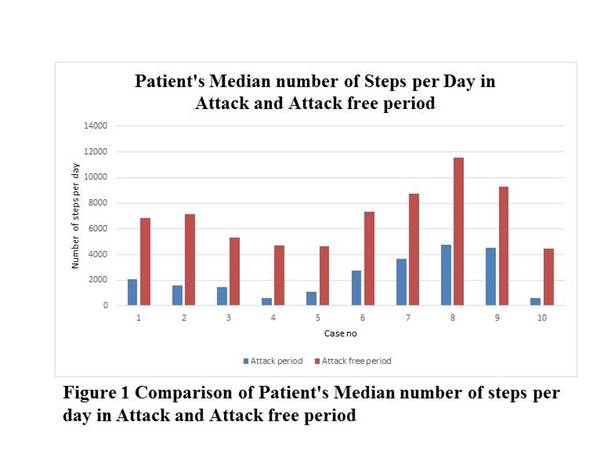Session Information
Date: Monday, October 22, 2018
Session Type: ACR Poster Session B
Session Time: 9:00AM-11:00AM
Activity Tracker bracelets captures Familial Mediterranean Fever attacks and their impact on daily physical activities
Background/Purpose: Familial Mediterranean fever (FMF) is a recessively inherited systemic auto-inflammatory disease characterized by recurrent febrile episodes. Typical FMF attacks are mostly devastating and exhausting and results in bed confinement. The objective of this study was to assess the impact of FMF attacks on daily physical activities and detection of FMF attacks by using a connected activity tracker.
Methods:
Patients, who had definite diagnosis of FMF according to Tel- Hashomer criteria and agreed to use a validated activity tracker were included in this prospective observational study. Daily physical activities and whether patient weared the device were examined daily via the software of activity tracker. All-patient reported data including occurrence of an attack were collected weekly via mobile phone conversation to avoid memory bias. Median steps per day were calculated each patient. Wilcoxon rank test was used to compare median daily physical activities during attacks and attack free periods. Sensitivity and specificity thresholds for capturing attacks were set to 2/3 step number of median attack free days.
Results:
Twelve patients completed the stufy. Median age of participants was 26 (18-32) and 5 (%42) of them were female. Median disease duration was 156 (36-300) months. Ten patients harbored homozygous or compound heterozygous, while one patient had single heterozygous exon 10 MEFV mutations.
While the duration of follow up was 514 days, the number of days that patient’s weared activity tracker was 452 days (88%). Mean activity tracker use was 37.7±21 days. Ten of the patients reported at least one attack in the observation period. In sum, patients reported 28 separate attacks with a total duration of 45 days (10%). Patients walked a median of 7302 (4500-10300) steps per/day in attack free days, while this number decreased to 1841 (590-4700) steps in attack days. For the assessment of whether activity tracker was capable of capturing an attack, cut off value was determined as two tertile of median steps-day. Activity tracker captured 42 of 45 attack days, 312 of 361 attack free days for each patient. Cut-off value was found %93 sensitive, and %86 specific for capturing attacks.
Conclusion:
FMF attacks significantly affect daily physical activity of patients. Activity tracking may also be a reasonable way to capture and document FMF attacks. This might prevent errors due to memory bias and help to identify patients resistant to medical therapy. Thus, daily physical activity tracking may be a better way of following up the patient aiding more accurate treatment decision for FMF patients who declares frequent attacks.
To cite this abstract in AMA style:
Babaoglu H, Varan O, Atas N, Satis H, Salman R, Ozturk MA, Goker B, Haznedaroglu S, Tufan A. Activity Tracker Bracelets Captures Familial Mediterranean Fever Attacks and Their Impact on Daily Physical Activities [abstract]. Arthritis Rheumatol. 2018; 70 (suppl 9). https://acrabstracts.org/abstract/activity-tracker-bracelets-captures-familial-mediterranean-fever-attacks-and-their-impact-on-daily-physical-activities/. Accessed .« Back to 2018 ACR/ARHP Annual Meeting
ACR Meeting Abstracts - https://acrabstracts.org/abstract/activity-tracker-bracelets-captures-familial-mediterranean-fever-attacks-and-their-impact-on-daily-physical-activities/

